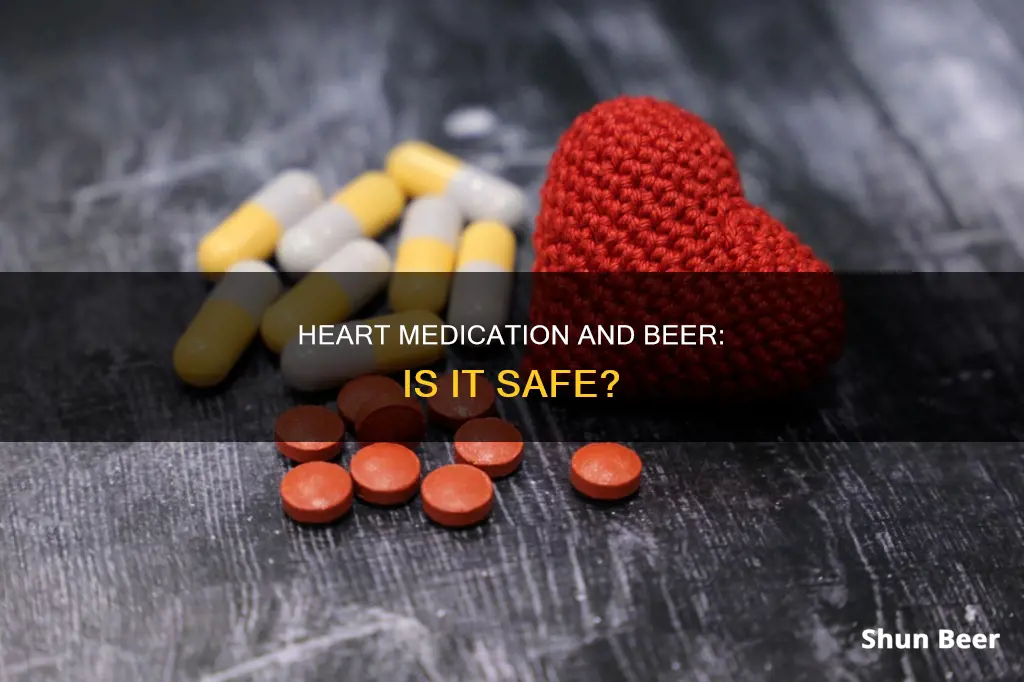
Drinking alcohol while on heart medication is a topic that requires careful consideration. While some studies suggest that moderate alcohol consumption may offer potential heart health benefits, it is crucial to understand the risks and interactions with medications. Heart or blood pressure medications can interact with alcohol, leading to side effects such as dizziness, increased heart rate, fainting, drowsiness, and low blood pressure. Additionally, alcohol can contribute to weight gain, indirectly affecting heart health. It is essential to consult a doctor or pharmacist to understand the specific interactions and risks associated with combining alcohol and heart medication.
| Characteristics | Values |
|---|---|
| Can alcohol be beneficial for the heart? | Some studies have shown that moderate drinking (one drink a day for women and one or two for men) can lower the risk of dying from heart disease. |
| How does alcohol help the heart? | Alcohol may help raise HDL or "good" cholesterol, prevent blood from clotting, and prevent damage caused by high LDL, the "bad" cholesterol. |
| Can alcohol be harmful to the heart? | Heavy drinking can lead to serious health problems like liver disease, cancer, peptic ulcers, and heart conditions such as cardiomyopathy, high blood pressure, heart failure, and stroke. |
| Can alcohol be consumed with heart medicine? | Common heart or blood pressure medicines can interact with alcohol, causing side effects such as dizziness, a fast heart rate, fainting, drowsiness, low blood pressure, or a dangerous fall or injury. Alcohol can also affect liver enzymes, altering drug levels in the bloodstream and potentially worsening side effects or reducing medicine effectiveness. |
What You'll Learn
- Alcohol may help prevent heart disease by raising good cholesterol
- Alcohol may prevent blood from clotting, reducing the risk of heart attacks
- Excessive drinking can lead to high blood pressure and heart failure
- Alcohol can have toxic effects on the heart muscle, causing a disruption in heart rhythm
- Heart medication and alcohol can cause side effects such as dizziness, drowsiness, and fainting

Alcohol may help prevent heart disease by raising good cholesterol
It is a popular belief that alcohol, especially red wine, is good for the heart. However, the truth is not so clear-cut. While some studies have shown an association between moderate alcohol intake and a lower risk of dying from heart disease, it's hard to determine cause and effect. For instance, red wine drinkers may be more likely to eat a heart-healthy diet.
There is some evidence that moderate amounts of alcohol might help to slightly raise levels of "good" HDL cholesterol. HDL protects heart health because it collects excess cholesterol and transports it to the liver, where it can be removed or recycled. This reduces the formation of plaque in the arteries. Having higher levels of HDL cholesterol may help protect against heart disease and related death.
In particular, red wine might offer the greatest benefit for lowering heart disease risk and death because it contains higher levels of natural plant chemicals, such as resveratrol, that have antioxidant properties and might protect artery walls. However, it's important to note that exercise can also boost HDL cholesterol levels, and antioxidants can be found in other foods, such as fruits, vegetables, and grape juice.
While light to moderate alcohol intake may improve HDL cholesterol, heavy drinking is associated with elevated levels of LDL cholesterol, total cholesterol, and triglycerides, as well as an increased risk of heart disease and death. Heavy drinking is defined as more than 14 drinks per week for men and more than 7 drinks per week for women.
Additionally, heavy drinking can lead to high blood pressure, heart failure, stroke, and cardiomyopathy, a disorder that affects the heart muscle. Alcohol can also contribute to obesity and increase the risk of certain cancers, liver disease, and cirrhosis of the liver.
Therefore, while light to moderate alcohol intake may have some benefits for heart health, it is important to consume alcohol in moderation and prioritize a healthy diet and lifestyle to maintain optimal cholesterol levels and reduce the risk of heart disease.
Ireland's Green Beer: Fact or Fiction?
You may want to see also

Alcohol may prevent blood from clotting, reducing the risk of heart attacks
Alcohol may have a detrimental impact on your heart and blood vessels. Heavy drinking is linked to a number of poor health outcomes, including heart conditions. Excessive alcohol intake can lead to high blood pressure, heart failure, or stroke.
However, some studies have shown an association between moderate alcohol intake and a lower risk of dying from heart disease. Moderate drinking is defined as an average of one drink per day for women and one or two for men. One drink is typically defined as 12 ounces of beer, 4-5 ounces of wine, or 1.5 ounces of 80-proof spirits.
It is important to note that the protective effects of moderate drinking are still debated, and there is no standard recommendation regarding alcohol consumption for people with heart problems. Additionally, the benefits of moderate drinking can be obtained through other means, such as exercise and a healthy diet.
One potential benefit of moderate alcohol consumption is its impact on blood clotting. Alcohol acts as a blood thinner, making it harder for blood to clot. This may reduce the risk of certain types of strokes caused by blockages in blood vessels. However, excessive drinking can have the opposite effect, increasing the risk of blood clots.
In conclusion, while moderate alcohol consumption may provide some protective effects for the heart, it is important to remember that excessive drinking can lead to serious health problems, including heart conditions. Additionally, the benefits of moderate drinking can be obtained through other means, such as exercise and a healthy diet. Therefore, it is crucial to drink in moderation and prioritize healthy lifestyle choices.
Detox and Drinking: Is Having a Beer Safe?
You may want to see also

Excessive drinking can lead to high blood pressure and heart failure
When a person consumes excessive amounts of alcohol, their heart muscles stretch and weaken, affecting the heart's ability to pump blood effectively. This reduction in blood flow can damage organs and tissues and lead to severe problems such as heart failure. Additionally, excessive alcohol intake can cause an increase in blood pressure, which is a significant risk factor for heart disease. High blood pressure means the heart has to work harder to pump blood around the body.
The more alcohol you drink, the higher the risk of developing hypertension. Regular drinking, especially if you're over 35, increases this risk. Consuming just one drink per day can increase the likelihood of hypertension. Binge drinking and long-term heavy drinking can also lead to strokes, as alcohol causes the heart to beat too quickly or irregularly, resulting in arrhythmias or irregular heart rhythms.
The American Heart Association recommends limiting alcohol intake to no more than two drinks per day for men and one drink per day for women. These moderate levels of drinking are generally not considered harmful to the heart. However, for those with certain heart conditions or heart failure, even moderate drinking may be inadvisable.
Beer and Food Poisoning: Safe Drinking After Recovery?
You may want to see also

Alcohol can have toxic effects on the heart muscle, causing a disruption in heart rhythm
Alcohol-induced cardiomyopathy is another condition caused by long-term heavy alcohol use, where the heart changes shape and causes long-term damage. The heart muscles stretch and enlarge, weakening the heart and reducing its ability to pump blood effectively. This can lead to heart failure and severe problems. Abstaining from alcohol may help some people recover, but others may need medication or surgery.
Heavy drinking is defined as more than eight drinks per week for women and more than 15 drinks per week for men. It can lead to high blood pressure, heart failure, stroke, and cardiomyopathy. It can also contribute to obesity and related health problems. Therefore, it is important to drink in moderation, which is defined as one drink per day for women and one to two drinks per day for men.
Beer and Medication: Safe or Not?
You may want to see also

Heart medication and alcohol can cause side effects such as dizziness, drowsiness, and fainting
Drinking alcohol while on heart medication can be dangerous. Alcohol interacts with many common heart or blood pressure medications, leading to side effects such as dizziness, drowsiness, and fainting. These side effects can be even more severe when drinking alcohol, as alcohol itself can cause low blood pressure and dizziness, especially in older patients. Mixing alcohol with medication that has similar side effects can be extremely hazardous and even life-threatening.
Heart medications that can cause side effects when combined with alcohol include ACE inhibitors or ARBs (e.g., lisinopril or losartan), alpha-blockers (e.g., clonidine or doxazosin), antianginal agents (nitrates) such as nitroglycerin or isosorbide, beta-blockers (e.g., atenolol or metoprolol), diuretics (e.g., hydrochlorothiazide or furosemide), and calcium channel blockers (e.g., verapamil or amlodipine).
The combination of alcohol and certain heart medications can lead to orthostatic hypotension, which is a sudden drop in blood pressure when standing up from a sitting or lying-down position. This can result in dizziness, lightheadedness, or fainting and increases the risk of falls, injuries, or broken bones. Additionally, alcohol can affect liver enzymes, altering drug levels in the bloodstream and potentially worsening side effects or reducing the effectiveness of the medication.
It is crucial to be aware of the potential risks and always consult a doctor or pharmacist before consuming alcohol while taking any medication, especially heart or blood pressure medication. The specific risks and recommendations may depend on factors such as age, current health status, and the type of heart medication being taken.
Furthermore, excessive alcohol consumption is linked to heart problems such as alcoholic cardiomyopathy, where long-term heavy alcohol use changes the shape of the heart, leading to heart failure and severe problems. Even without medication, heavy drinking can contribute to high blood pressure, heart failure, stroke, and cardiomyopathy. Therefore, it is generally recommended to drink in moderation or not at all, especially for individuals with heart-related issues.
Hepatitis B Patients: Is Drinking Beer Safe?
You may want to see also
Frequently asked questions
It is not recommended to drink beer or any other alcoholic beverage while on heart medicine. Alcohol can interact with heart or blood pressure medications, causing side effects such as dizziness, an increased heart rate, fainting, drowsiness, low blood pressure, or a dangerous fall or injury.
Side effects of drinking alcohol while on heart or blood pressure medicine include dizziness, a fast heart rate, fainting, drowsiness, low blood pressure, or a dangerous fall or injury. Mixing alcohol with certain medications can also increase the risk of complications such as stomach bleeding and liver damage.
Some studies suggest that moderate drinking—one drink per day for women and one to two drinks per day for men—may lead to a lower risk of dying from heart disease. However, it is important to note that these potential benefits may be due to other lifestyle choices that light drinkers make, such as maintaining a healthy diet and exercising regularly.
Excessive alcohol intake is linked to a number of negative health outcomes, including heart conditions. Heavy drinking can lead to high blood pressure, heart failure, or stroke. It can also contribute to cardiomyopathy, a disorder that affects the heart muscle, and increase the risk of obesity and related health problems.







